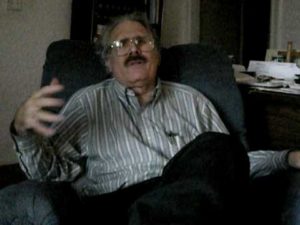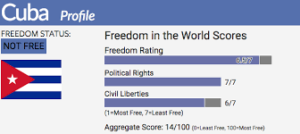Pro-democracy activists are mourning the loss of a leading architect of Cuba’s civil society and human rights movement.
“The seed of this civil society was planted on January 28, 1976, with the name of the Cuban Committee for Human Rights under the direction of Dr. Ricardo Bofill and a small group of intellectuals,” a 2012 U.S. Senate hearing was told.
 Bofill (right) died at dawn on Friday in Miami Nora Gámez Torres wrote in El Nuevo Herald. He “dedicated his entire life to and suffered years in Cuban prisons for defending human rights,” said the Center for a Free Cuba. One of the best-known opponents of Fidel Castro. The Washington Post described him as “a Cuban hero,” while to others he was an icon of the Cuban resistance.
Bofill (right) died at dawn on Friday in Miami Nora Gámez Torres wrote in El Nuevo Herald. He “dedicated his entire life to and suffered years in Cuban prisons for defending human rights,” said the Center for a Free Cuba. One of the best-known opponents of Fidel Castro. The Washington Post described him as “a Cuban hero,” while to others he was an icon of the Cuban resistance.
Cuba’s record on human rights remains the same even though the Castro brothers appear to no longer be in charge, a House Foreign Affairs Committee hearing entitled “Human Rights in Cuba: Beyond the Veneer of Reform” was told, Michael Volpe writes for Al Dia. While ostensibly Miguel Díaz-Canel is President of Cuba, the Castro family continues to be in charge, said John Suarez, the Executive Director for the Center for a Free Cuba.
“Sixty years later, Fidel Castro is gone, but his brother Raul remains, along with the Communist regime. What is called reform in Cuba has been a frog for the dynastic succession of the Castro family.” Suarez said. “Raul Castro remains in control of the government as the head of the Communist Party. His son Alejandro Castro, a colonel in the Ministry of the Interior, presided over the Cuban side in the negotiations to normalize relations during the previous administration.”
Cuba is “a defining example of a captive nation,” OAS Secretary General Luis Almagro told this week’s Captive Nations Week Summit. “The communist dictatorship not only enslaves, represses, tortures, assassinates, persecutes, intimidates & forces into exile its people, but also exports these totalitarian practices to the rest of the region.”
 Castro and other members of the government “acted personally against us, terrorized or tried to terrorize our family members,” Bofill told the Cuban magazine Amanecer. “They beat us, did horrendous things to us, all kinds of tortures .. .and that’s where the idea arose of defending ourselves in an organized manner and of creating the Cuban Committee for Human Rights.”
Castro and other members of the government “acted personally against us, terrorized or tried to terrorize our family members,” Bofill told the Cuban magazine Amanecer. “They beat us, did horrendous things to us, all kinds of tortures .. .and that’s where the idea arose of defending ourselves in an organized manner and of creating the Cuban Committee for Human Rights.”
In a tribute in Miami in 2015, writer Carlos Alberto Montaner highlighted the political importance of Bofill’s work in the Committee. “From the creation of the Cuban Committee for Human Rights, in the remote decade of the ‘70s, the political battle… became a battle for the dignity of people,” Montaner told the Miami Herald:
A former professor of philosophy at the University of Havana, Bofill was imprisoned on several occasions by the government of Fidel Castro, the first in 1968, when he was sentenced to 12 years for the crime of distributing “enemy propaganda.” He was released in 1975 and a year later he founded the Cuban Committee for Human Rights, compiling and disseminating information about the violations committed by the Cuban government abroad.
Bofill was denied a visa to attend the Polish Human Rights Foundation’s Second International Human Rights Conference in Leningrad in 1990 sponsored by the National Endowment for Democracy.







